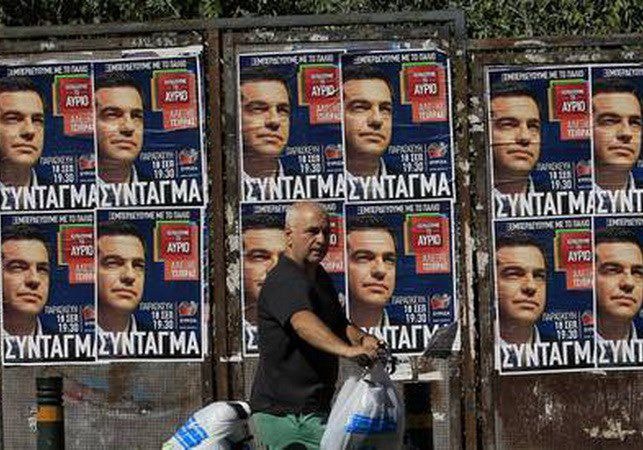Early elections, Greece faces new uncertainties
 |
| PressureSyriza party election poster in central Athens. (Source: ANSA) |
Less than a year after a snap election brought Prime Minister Alexis Tsipras' Syriza party to power, Greek voters are once again heading to the polls for another vote that promises to be somewhat uncertain on September 20.
The vote was a result of Prime Minister Tsipras' resignation last August, after the Greek Parliament approved the package of agreements that the Athens government signed with international creditors regarding a loan package worth 86 billion euros over the next 3 years in exchange for tighter and more stringent austerity measures.
The terms passed, but Prime Minister Tsipras, who also heads the Syriza party, lost his parliamentary majority and the government collapsed. Caretaker Prime Minister Vassiliki Thanou became the first woman to head the Greek government, until the vote on 20 September.
According to analysts, the biggest confrontation in this vote will be between Syriza and the conservatives of the center-right party Nea Demokratia (ND). By agreeing to the very harsh terms of the creditors and going against the spirit of the referendum last July, Syriza has seriously lost popularity among voters and some of its MPs have split off to form a new party.
However, opinion polls the day before the vote showed Syriza was still the largest party. A survey by Saloniki University and Skai TV showed 33% of likely voters were voting for Syriza, but the gap between them and ND was not large, with ND attracting 28% of voters.
A Mega TV poll showed Syriza's support rate was 28%, just 2% more than ND.
Greek political analysts say whichever party wins the election will have to form a coalition to govern the country and must comply with the terms signed with creditors regarding loans and find a way to get the country's economy out of its current slump.
Since 2010, Greek governments have been powerless to "brake" the economic ship sinking to the bottom of the crisis, with sky-high unemployment, skyrocketing foreign debt and increasingly serious social unrest.
In the 7 months in power since winning the election on January 25 this year with a record high of 59%, Prime Minister Tsipras' government is said to have been powerless to steer the country and has been blamed by far-left and far-right forces for "surrendering" to creditors in all aspects.
If elected Prime Minister again, Tsipras will not be able to avoid forming a coalition in the government, but has affirmed that he will not cooperate with the People's Republic at any cost.
Meanwhile, Vangelis Meimarakis, leader of ND, announced that he would form a grand coalition, including with left-wing and far-left parties, to "follow the will of the people" in the referendum, meaning to oppose any form of further austerity.
Tsipras and Meimarakis, if they win, will rely heavily on smaller parties to form a coalition, many of which do not get more than the 3% threshold needed to get seats in parliament. But the biggest concern for many is that voters, frustrated with the state of the country and dissatisfied with the political establishment, will not turn out in large numbers. Voter turnout on January 25 was 64%, a figure considered quite high.
If Greece's 9.8 million voters fail to elect a winner, Greek President Propokis Pavlopoulos will hand over the reins of government to the leader of the majority party. If that fails, he will appoint the leader of the second or third largest party as prime minister.
If even these efforts fail, voters will return to the ballot box, in a deepening political crisis for a country already impoverished by economic and debt crises./.
According to VN+
| RELATED NEWS |
|---|
